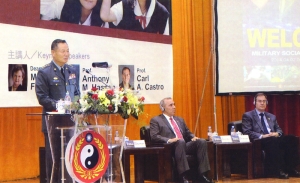School Advises Taiwan on Military Social Work
May 20, 2014 / by Claudia Bustamante- Research
The USC School of Social Work’s international influence continues to grow after Dean Marilyn Flynn and faculty traveled to Taiwan to discuss the importance of military social work.
Flynn, along with Anthony Hassan, clinical professor and director of the Center for Innovation and Research on Veterans & Military Families, and Carl Castro, assistant professor, were invited last month to share their expertise on the development of a military social work academic program and how it will benefit the country as it moves toward an all-volunteer military force.
Currently, all Taiwanese men age 20 and over must serve a year in the military. Taiwanese officials hope to end high turnover and recruit a higher-caliber professional force by becoming all-volunteer by 2017. They are incentivizing the military profession and offering increased salary and benefits, improved living conditions and opportunities for academic advancement, among others.
Held at military academy Fu Hsing Kang College in Taipei, about 250 people, including military cadets, faculty members and senior military leaders attended a day-long conference to learn about the history of military social work, the benefits of incorporating it into the military ranks and some of the lessons learned about starting an academic program.
“You can see what they don’t have and how important it’ll be for them once they set it up,” said Hassan, a retired Air Force mental health officer. “They delegate social work in a way that makes it an additional duty for an officer. That’s not what a social worker is. It’s a profession with an advanced degree.”
In 2009, the University of Southern California became the first major research institution to offer a military social work specialization. Numerous reports and research showed that increased numbers of service members were returning from Iraq and Afghanistan suffering from combat stress disorders, like post-traumatic stress disorder and traumatic brain injury. The USC School of Social Work was ideally situated to help address their needs.
USC’s program aims to prepare students on the unique challenges facing veterans, active duty military and their families. More than 1,200 Master of Social Work students have graduated from the military social work program, since its inception.
Military social workers play a critical role in sustaining the health and well-being of an all-volunteer force.
“When you look at all the roles social workers play, we touch every important aspect in an all-voluntary military,” Hassan said, from ensuring they are fit to serve and physically and mentally ready during humanitarian missions and wartime to retaining them in the profession by making sure their needs are addressed.
“Military social workers are also very important as service members transition throughout their career—and back into civilian life once it’s ended.”
The group also presented practical advice for military social workers and highlighted some of the key challenges seen in the profession, such as a reluctance to seek help or admit to mental health problems, how leaders often overlook social workers except in times of crisis, and that social workers have dual clients—the service member and the commander who may need to know when issues arise that risk the safety of a unit.
As Taiwan moves forward with its plans for an all-volunteer force, there is a renewed focus on formalizing a military social work profession.
“The most important problems facing the world today are behavioral and psychosocial,” Castro said. “It's a tribute to the leadership of the Taiwanese government and military that they are trying to address many of their behavioral health issues via the social worker.”
To reference the work of our faculty online, we ask that you directly quote their work where possible and attribute it to "FACULTY NAME, a professor in the USC Suzanne Dworak-Peck School of Social Work” (LINK: https://dworakpeck.usc.edu)
